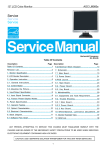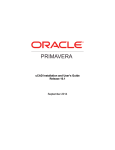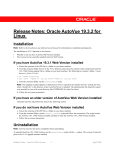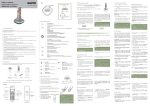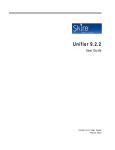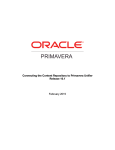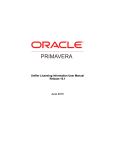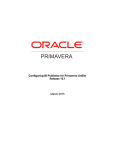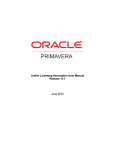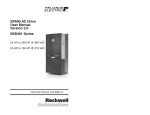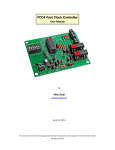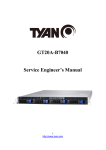Download Click here for the Unifier Performance and Sizing Guide
Transcript
Unifier Performance and Sizing Guide Release 10.1 September 2014 Contents Overview of the Performance and Sizing Guide ................................................. 5 Prerequisites .......................................................................................... 5 Assumptions ........................................................................................... 5 Architecture Overview ............................................................................... 7 Performance Considerations........................................................................ 11 Vertical Scaling (Scaling Up) ...................................................................... 11 JVM Heap Sizes ..................................................................................... 11 Hardware Upgrade ................................................................................. 11 Operating System Upgrade........................................................................ 12 Horizontal Scaling (Scaling Out) ................................................................. 12 Database Scaling and Clustering ................................................................. 12 Deployment Considerations......................................................................... 12 Deployment Categories .............................................................................. 12 Storage Requirements ............................................................................. 13 Primavera Unifier Application Server Configuration .......................................... 13 Primavera Unifier Database Server Configuration ............................................. 13 Deployment Architectures .......................................................................... 14 Configuration for Small Deployments: Up to 200 Concurrent Users ........................ 14 Configuration for Medium Deployments: 200 - 500 Concurrent Users ...................... 15 Configuration for Large Deployments: 500 -1000 Concurrent Users ........................ 15 Network Bandwidth Estimation .................................................................... 16 Factors that Affect Application Performance ................................................... 16 Configuration, Hardware, and Environment Factors .......................................... 17 Other Actions that Affect Performance ......................................................... 17 Conclusion.............................................................................................. 18 Frequently Asked Questions ........................................................................ 18 For More Information ................................................................................ 19 Where to Get Documentation .................................................................... 19 Where to Get Training ............................................................................. 26 Where to Get Support ............................................................................. 26 Additional Support ................................................................................. 27 Legal Notices .......................................................................................... 30 3 Overview of the Performance and Sizing Guide The Unifier Performance and Sizing Guide provides guidance for planning product deployment with: estimates of hardware and software requirements for Unifier, and recommendations for deploying small-scale to large-scale configurations In This Section Prerequisites .............................................................................................................5 Assumptions .............................................................................................................. 5 Prerequisites AutoVue Refer to the Tested Configurations Information document for the version number. Assumptions The following assumptions are made in this document: A highly available environment is desired. Database-specific best practices for high availability, backup, and recovery are being followed. Note: The hardware and software requirements for third-party ERP Web Services/API implementation are out of the scope of this document. 5 Architecture Overview Primavera Unifier is comprised of the following main components: One or more application servers (WebLogic or WebSphere) Oracle HTTP Server with WebLogic A database server AutoVue server and Multiple optional supporting servers for Reporting - BIP Report Server Security and identity services - OAM Server, OIM Servers, and OEM Server 7 Unifier Performance and Sizing Guide 8 Content Management - WebCenter Content, Share Point, or CMIS Architecture Overview Primavera Unifier resides on a WebLogic application server, and the Primavera Unifier data repository resides on the database server. A typical Primavera Unifier deployment consists of the following components: One or more application servers (WebLogic) End-users, including administrators, interact with Primavera Unifier through the application server. RDBMS as a data repository for Primavera Unifier Depending on the dataset size, the database server can be a standalone or clustered server. For optimized performance, Oracle Primavera recommends the Primavera Unifier application server, Primavera Unifier RDBMS, and its supporting servers be co-located. For example, within the same subnet to avoid network latency. The best deployment is to have them all co-located. 9 Performance Considerations There are multiple ways to achieve the desired performance level in Primavera Unifier. Organizations can decide this based on the following factors: The desired level of performance Availability requirements Short-term or long-term outlook of system usage Number of concurrent users In This Section Vertical Scaling (Scaling Up) ................................................................................... 11 JVM Heap Sizes ...................................................................................................... 11 Hardware Upgrade .................................................................................................. 11 Operating System Upgrade ..................................................................................... 12 Horizontal Scaling (Scaling Out) .............................................................................. 12 Database Scaling and Clustering ............................................................................. 12 Vertical Scaling (Scaling Up) Vertical scaling involves adding additional resources, or upgrading resources on an existing system. Vertical scaling is usually a good approach if the application bottlenecks are processor and memory-related. JVM Heap Sizes The objects (such as Projects, Activities, Assignments, etc.) are stored in the Java Virtual Machine (JVM) heap allocation. Most of these objects are short-lived and are periodically cleaned up by the JVM’s garbage collection mechanism. As the number of objects increases, performance and scalability is affected by the available heap space in the JVM. Increasing the heap size is an easy way to achieve desired performance and scalability. Hardware Upgrade Desired performance and scalability can also be achieved by upgrading the CPU, adding extra cores, adding physical memory, upgrading to faster I/O devices, and upgrading from 32-bit to 64-bit hardware. Oracle Primavera recommends 64-bit hardware. 11 Unifier Performance and Sizing Guide Operating System Upgrade The desired performance level can also be achieved by upgrading to latest versions of the operating system, installing the latest patch updates and upgrading from a 32-bit version to a 64-bit version. Oracle Primavera recommends the 64-bit version. While vertical scaling is easier to achieve, it does not address availability completely. If the desired level of availability is high, then vertical scaling alone will not be sufficient. Horizontal Scaling (Scaling Out) As the demand for applications grows, additional nodes can be added to an existing application server cluster to handle the increased system load. For high availability requirements, horizontal scaling is the better option. Database Scaling and Clustering Database server scaling options are available and have been widely adopted and implemented. Database clustering enables multiple nodes in a clustered system to mount and open a single database that resides on shared disk storage. This configuration provides high availability in the database environment. Oracle Real Application Clusters (RAC) is an example of database clustering. Deployment Considerations Oracle Primavera Unifier performance depends on the load and the response characteristics of each tier. Factors affecting performance are identified in the following sections. Consider the following factors during deployment planning: Follow the Unifier Installation and Setup Guide for WebLogic accurately Set up the correct heap size for the application servers. Establish proper access for the supporting servers such as email account, BIP report account Define adequate table spaces for the database Provide plenty of disk space for file repository Deployment Categories Primavera Unifier deployments can be categorized from small through large. The criteria to classify the deployments depends on the following factors: Number of named users 12 Deployment Categories Number of concurrent users These factors influence the hardware and software specifications during Primavera Unifier deployment. The following section outlines server and storage requirements for a wide range of named users and concurrent users. For optimal system performance, Oracle Primavera highly recommends deploying Primavera Unifier on a 64-bit architecture. A 64–bit architecture includes a 64-bit hardware, 64-bit operation system, 64-bit application servers and databases deployments, using 64-bit Java JDK. Storage Requirements The following table lists storage requirements for number of projects / shells in the range, 1,000 10,000. Number of Projects / Shells 1,000 5,000 10,000 Network storage for files 300 GB 1500 GB 3000 GB Database Storage 50 GB 250 GB 500 GB Primavera Unifier Application Server Configuration Operating System Oracle Enterprise Linux 5, 8 x86_64 VM CPU 4 Intel (R) Xeon (R) CPU E5-2690 [email protected] GHz or equivalent RAM 16 GB Java Heap Size 10 GB Storage 100 GB Primavera Unifier Database Server Configuration Operating System Oracle Enterprise Linux 5,8 x86_64 VM CPU 4 Intel(R) Xeon(R) CPU E5-2690 0 @ 2.90GHz or equivalent RAM 16 GB Storage See Minimum Database Storage under Storage Requirements (on page 13). 13 Unifier Performance and Sizing Guide Deployment Architectures The following sections provide estimates of server configurations for varying number of named users and concurrent users. A named user is a user who has an account with the system, but currently may not be logged in. A concurrent user is a user currently logged in the system. . Note: The hardware sizing is based on concurrency figures and concurrency is assumed to be 20% of the named users. Based on typical production environment and respective loads, Unifier Application can be categorized into three types as mentioned below: Small Deployments A typical small deployment will have 200 or less concurrent users accessing Unifier. Medium Deployments A medium deployment may have 200 - 500 concurrent users. Large Deployments A typical large deployment may have 500 - 1000 concurrent users. Configuration for Small Deployments: Up to 200 Concurrent Users Server Proposed Hardware OHTTP Server 2 vCPU, 8GB RAM Unifier Application Server 4 vCPU, 16GB RAM Unifier Integration Server 2 vCPU, 8GB RAM Unifier Background Server 2 vCPU, 8GB RAM Mail Server Unifier Database Server 4 vCPU, 16GB RAM OAM/OIM/OID Server (App) 4 vCPU, 16 GB RAM UCM, Autovue Server 4 vCPU, 16GB RAM BIP App Server 2 vCPU, 8GB RAM UCM DB Server 4 vCPU, 16GB RAM BIP DB Server OID DB Server Total 14 28 vCPU, 112GB RAM Deployment Architectures Configuration for Medium Deployments: 200 - 500 Concurrent Users Server Proposed Hardware OHTTP Server 2 vCPU, 8GB RAM Unifier Application Server 2 x (4 vCPU, 16GB RAM) Unifier Integration Server 2 vCPU, 8GB RAM Unifier Background Server 2 vCPU, 8GB RAM Mail Server Unifier Database Server 4 vCPU, 16GB RAM OAM/OIM/OID Server (App) 4 vCPU, 16 GB RAM UCM, Autovue Server 4 vCPU, 16GB RAM BIP App Server 2 vCPU, 8GB RAM UCM DB Server 8 vCPU, 32GB RAM BIP DB Server OID DB Server Total 36 vCPU, 144GB RAM Configuration for Large Deployments: 500 -1000 Concurrent Users Server Proposed Hardware OHTTP Server 4 vCPU, 16GB RAM Unifier Application Server 4 x (4 vCPU, 16GB RAM) Unifier Integration Server 4 vCPU, 8GB RAM Unifier Background Server 4 vCPU, 8GB RAM Mail Server Unifier Database Server 8 vCPU, 32GB RAM OAM/OIM/OID Server (App) 4 vCPU, 16GB RAM UCM, Autovue Server 4 vCPU, 16GB RAM BIP App Server 4 vCPU, 16GB RAM UCM DB Server 8 vCPU, 32GB RAM BIP DB Server 15 Unifier Performance and Sizing Guide OID DB Server Total 56 vCPU, 224GB RAM Network Bandwidth Estimation Based on page sizes of the application, network bandwidth estimation for Unifier web transactions is done. On a basic assumption that a page will take approximately 2 seconds to load and a user will on an average pause for 3 seconds before firing the next request to the server, a rough estimate for network bandwidth requirement is calculated. Here is the bandwidth requirement for different concurrent user loads. Bandwidth is measured in Kilo bits per second and Mega bits per second respectively Number of Users Bandwidth Requirement (Kbps) Bandwidth Requirement (Mbps) 1 10 25 50 100 325 3250 8125 16250 32500 65000 0.32 3.17 7.93 15.87 31.74 200 63.48 This estimation is essentially for the requests made from the client to web/app server. The requirement for bandwidth between application server and database server/other enabling technologies may be different. Factors that Affect Application Performance This document covers performance for the overall Primavera Unifier configuration architecture. However, factors in the database setup play a very important role in performance. The following factors can impact database performance: 16 Hardware architecture and operating system NIC (number of NICs, speed and duplex settings) Number of database instances on a server (dedicated versus shared) Disk storage system performance (I/O speed, buffer, mirroring) Table space layout and extent sizing Table data, index, and LOB distributions on table spaces Table and index fill factor definition Database block sizing Connection management (dedicated versus MTS) Factors that Affect Application Performance RAM allocations (automatic, SGA, PGA, shared pool, buffer pool) CBO optimizer parameter configuration setting Database table and index statistics gathering mechanism and frequency Anti-virus software Additional database jobs Configuration, Hardware, and Environment Factors The following factors can also impact the application performance: Amount of memory available on client for browser Amount of heap memory available to application server’s JVM (-Xmx and other JVM heap-related settings) Unifier uses 10GB of java heap for all app servers. Number of worker threads configured in the application server Number of configured and available database connections Number of concurrent active users logged on to an application server Network throughput: The time it takes to download a 5K file between application server and browser Network latency between browser and application server Number of users that will be concurrently loading data Number of other applications running on the application server’s CPU (CPU utilization before Unifier is installed) Amount of I/O being performed by other applications running on application server’s CPU (sharing the same NIC) Number of CPUs in an application server cluster Other Actions that Affect Performance Some of the other actions that can also impact application performance include the following: User actions User actions play a key role in the scalability of the application. When sizing a configuration, you need to understand the operations users plan on doing. For example, if you have 200 users in the system all working and loading cost sheets/schedule sheets into the page, then you can expect the application to perform slowly. However, if you have 200 users who only login and look at task logs, custom dashboards the application will perform more quickly. You must consider user roles when determining your scaling options. Server hardware You need to evaluate your hardware to see if it will work with the application. If the server is old, it will probably not handle as many users as a newer server. In some cases, the server may also be virtualized or segmented. In both cases, this means there are fewer resources for the application. This must be considered when planning for the number of users a configuration can handle. Storage types 17 Unifier Performance and Sizing Guide All of Oracle Primavera’s tests are executed with local disks. You can use server-side disk storage or a SAN configuration for your servers. However, a SAN configuration can be more complex to setup with your system. You need to make sure that the connections to the SAN are working. Network You must ensure your network infrastructure is up-to-date and running efficiently. The application server and the database servers should be in the same location. Network locations of end-users Performance can also be affected by the network location of the end user relative to the application server. Any user that has many network hops to the application server will likely experience poor performance. More hops and high latency are key factors that you need to consider when planning an installation. An environment that contains many hops and high latency will have the most effect on key areas. Conclusion Following a systematic approach to evaluating, planning, and testing the architecture for your Primavera Unifier deployment is the only way to assure a successful deployment. With careful examination of the performance objectives, system availability requirements, short-term versus long-term outlook of system usage, the appropriate hardware choices can be made early in the process. Frequently Asked Questions Q. How much hardware does a Primavera Unifier installation require? Tables that describe the recommended hardware for each deployment size are described in the "Deployment Architectures" section of this document. Q. How much disk space does Primavera Unifier require? The Primavera Unifier application requires little space. However, you do need enough space to run the application server software (such as WebLogic or WebSphere) and to keep historic log files. You must also ensure that you have the appropriate amount of disk space available on you database server. Disk space recommendations can be found in the "Deployment Architectures" section of this document. Q. Should the Primavera Unifier database be installed in a shared database environment? For large deployments Oracle Primavera recommends a dedicated Primavera Unifier database server. 18 For More Information For More Information Where to Get Documentation If you need help with an operation in Primavera Unifier, there are a number of resources to help you. Online Help If you have a question or need further assistance regarding a specific feature, review the online help. Click the Help menu from any Primavera Unifier window, and choose: Unifier Help: This link goes to the Oracle Technical Network (OTN) Primavera Unifier Online Document Library. From here you can access: Primavera Unifier Online Help Primavera Unifier Administration Guide Primavera Unifier User's Guide Primavera uDesigner User's Guide Primavera Unifier Reference Guide You must have Adobe Acrobat Reader installed (available free at www.adobe.com). BP-specific Help: If your company has provided customized Help files for individual business processes, you can access them through the business process log or the Help menu. Note: For the full list of system requirements, supported software, and versions, see the Tested Configurations document under “Installation and Configuration Documentation” in the Primavera Unifier Online Documentation Library. Documentation Complete documentation libraries for Primavera Unifier releases are available on the Oracle Technology Network (OTN) at: http://www.oracle.com/technetwork/documentation/default-1870233.html From this location you can either view libraries online or download them to have local copies. We recommend viewing them from OTN to ensure you always access the latest versions, including critical corrections and enhancements. Primavera Unifier is configured to access its help system directly on OTN. However, a downloadable version of the help system is also available on OTN if you need to download, deploy, and access a local copy. 19 Unifier Performance and Sizing Guide The documentation assumes a standard setup of the product, with full access rights to all features and functions. The following table describes the core documents available for Primavera Unifier. Supplementary Documentation Title Description What's New Contains key enhancements in the current release of Primavera Unifier. All users should read this guide. Cumulative Features Overview Tool Provides an overview of features and enhancements included in Oracle Primavera products. It is intended solely to help you assess the business benefits of upgrading and to plan your I.T. projects. All users should read this guide. Readme for Media Pack Contains a table that can help you determine what downloads are required to run your licenses. All users should read this guide. Licensing Information User Manual Contains information about the third-party proprietary and open source software used in Oracle Primavera Unifier. All users should read this guide. Where to Get Documentation, Training, and Contains information about resources to Support help you with the operation of Oracle Primavera Unifier. All users should read this guide. 20 For More Information Installation Documentation Title Description Primavera Unifier Installation and Setup Guide For WebLogic Application Server Describes how to: Set up Primavera Unifier servers and third party services Install and configure Primavera Unifier components IT professionals who are installing and configuring the server environment, and the Primavera Unifier network administrator/database administrator and Primavera Unifier administrator should read this guide. Primavera Unifier Installation and Setup Guide for WebSphere Application Server Describes how to: Set up the Primavera Unifier servers and third party services on Linux (64-bit) Install and configure Primavera Unifier components IT professionals who are installing and configuring the server environment, and the Primavera Unifier network administrator/database administrator and Primavera Unifier administrator should read this guide. Unifier Performance and Sizing Guide Provides guidance for planning product deployment with: Estimates of hardware and software requirements for Primavera Unifier Recommendations for deploying small-scale to large-scale configurations The Unifier network administrator/database administrator and Unifier administrator should read this guide. Unifier Upgrade Guide Provides information on how to upgrade to the latest version of with Oracle Primavera Unifier. The Unifier network administrator/database administrator and Unifier administrator should read this guide. 21 Unifier Performance and Sizing Guide Title Description Tested Configurations Previously: System Configuration Information Provides the tested configurations for Oracle Primavera Unifier and includes list of applications and supported version levels. All users should read this guide. The Unifier network administrator/database administrator and Unifier administrator should read this guide. Primavera Unifier Security Guide Provides guidelines on how to plan your security strategy for Oracle Primavera Unifier. All users should read this guide. The Unifier network administrator/database administrator and Unifier administrator should read this guide. Configuration Documentation Title Description Primavera uClient Configurator Setup Guide Describes how to set up the Primavera uClient Configurator. All users should read this guide. Primavera Unifier SmartForm Installation and User Guide Describes how to download and install the Primavera Unifier SmartForm utility for Microsoft Word® 2003 Professional and how to use the SmartForm utility to create or update Primavera Unifier business process records. Note: If you use Microsoft Word® 2007 it must be a version prior to SP2 and you must save your document in Microsoft Word® 2003 (.doc) format. All users should read this guide. Primavera Unifier File Transfer Utility Instructions Describes how to download and install the Primavera Unifier File Transfer Utility. 22 For More Information Title Description uCAD Installation and User's Guide Provides instructions on how to download and install the Primavera Unifier uCAD Application on your desktop and configure it to work with your AutoCAD® application. It also includes details on how to use uCAD with AutoCAD and Primavera Unifier. All users should read this guide. Configuring BI Publisher for Unifier Provides instructions on how to: Download BI Publisher. Configure BI Publisher settings. Configure BI Publisher in Primavera Unifier. Create BI Publisher reports. Run BI Publisher reports. The Primavera Unifier network administrator/database administrator and Primavera Unifier administrator should read this guide. Configuring Unifier for Single Sign On Provides procedures to configure Primavera Unifier that is running on Windows (64-bit) or on Linux operating systems for Single Sign On (SSO). The Primavera Unifier network administrator/database administrator and Primavera Unifier administrator should read this guide. Connecting Oracle Enterprise Manager to Primavera Unifier Metrics Provides instructions on how to enable Enterprise Manager to display certain Primavera Unifier metrics. The Primavera Unifier network administrator/database administrator and Primavera Unifier administrator should read this guide. Connecting Oracle Identity Manager 11g to Guides administrators in configuring Oracle Primavera Unifier Identity Manager (OIM) to be used with Primavera Unifier. The Primavera Unifier network administrator/database administrator and Primavera Unifier administrator should read this guide. 23 Unifier Performance and Sizing Guide Title Description Connecting the Content Repository to Primavera Unifier Provides instructions on how to: Configure Oracle WebCenter Content Core Capabilities after you install it. Configure Microsoft SharePoint after you install it. Configure CMIS-compliant repositories after you install one. Configure the Primavera Unifier File Repository. Set your content repository settings in Primavera Unifier to connect to your content repository. The Primavera Unifier network administrator/database administrator and Primavera Unifier administrator should read this guide. User Documentation Title Description Primavera Unifier Help Provides topic-oriented information about Primavera Unifier to assist users with features and procedures. All users should read this guide. Primavera Unifier User's Guide Guides users on how to use Primavera Unifier application. All users should read this guide. Primavera uDesigner User's Guide Guides users on how to use the uDesigner feature of Primavera Unifier application. All users should read this guide. Primavera Unifier Administration Guide Provides details about the Administration Mode of Primavera Unifier, which covers access to Primavera Unifier functionality that is granted through permissions. All users should read this guide. 24 For More Information Title Description Primavera Unifier Project Controls User's Guide Explains Oracle Primavera: Capital Planning which is used for managing budget forecasts (both planned and in execution) for the user company. Cost Controls which supports project tracking and project cost management. Project Delivery Management which is designed to optimize project results. Anyone who wants to use the Unifier Project Controls base product should read this guide. Database Documentation Title Description Primavera Unifier Reference Guide Provides details about data definitions, data elements, permission settings, import codes, and pickers with Primavera Unifier. All users should read this guide. Integration Documentation Title Description Primavera Unifier Integration Interface Guide Describes the methods required for the integration, and the data being passed, between Primavera Unifier and an external system. Anyone who wants to develop applications which interact with Primavera Unifier should read this guide. Distributing Information to the Team You can copy the online documentation to a network drive for access by project participants. Each team member can then view or print those portions that specifically relate to his or her role in the organization. 25 Unifier Performance and Sizing Guide Where to Get Training To access comprehensive training for all Primavera products, go to: http://education.oracle.com Oracle Learning Library The Oracle Learning Library (OLL) provides online learning content covering Primavera products. Content includes whitepapers, videos, tutorials, articles, demos, step-by-step instructions to accomplish specific tasks, and self-paced interactive learning modules. To access the learning library’s Primavera content, go to: http://www.oracle.com/oll/primavera Where to Get Support If you have a question about using Oracle products that you or your network administrator cannot resolve with information in the documentation or help, click http://support.oracle.com/. This page provides the latest information on contacting Oracle Global Customer Support, knowledge articles, and the support renewals process. For more information about working with Support, visit https://support.oracle.com/epmos/faces/DocumentDisplay?id=888813.2 to view Support Tools & Tips. Access to Oracle Support Oracle customers have access to electronic support through My Oracle Support. For information, visit http://www.oracle.com/us/support/contact-068555.html or visit http://www.oracle.com/us/corporate/accessibility/support/index.html if you are hearing impaired. Using Primavera's Support Resource Centers Primavera’s Support Resource Center provides links to important support and product information. Primavera's Product Information Centers (PICs) organize documents found on My Oracle Support (MOS), providing quick access to product and version specific information such as important knowledge documents, Release Value Propositions, and Oracle University training. PICs also offer documentation on Lifetime Management, from planning to installs, upgrades, and maintenance. Visit https://support.oracle.com/epmos/faces/DocumentDisplay?id=1486951.1 to access links to all of the current PICs. PICs also provide access to: Communities, which are moderated by Oracle providing a place for collaboration among industry peers to share best practices. News from our development and strategy groups. Education via a list of available Primavera product trainings through Oracle University. The Oracle Advisor Webcast program brings interactive expertise straight to the desktop using Oracle Web Conferencing technology. This capability brings you and Oracle experts together to access information about support services, products, technologies, best practices, and more. 26 For More Information Additional Support The following is a list of additional support that are available in Unifier: Unifier Help Unifier Library Contact Support Download Plugins About Unifier Note: The Contact Support and Download Plugins options both open a single window, Support. The only difference is as follows: - Contact Support opens the Contact tab of the Support window by default - Download Plugins opens the Download tab of the Support window by default Unifier Help Click Help from the upper right-hand section of the Unifier window to open a contextual menu and click Unifier Help to open the Unifier and uDesigner Help. Unifier Library Click Help from the upper right-hand section of the Unifier window to open a contextual menu and click Unifier Library to open the Unifier documentation library. Contact Support Click Help from the upper right-hand section of the Unifier window to open a contextual menu and click Contact Support to open the Support window. The Support window has two tabs: Contact, which opens by default Download In the Contact tab, Contact Information section, you can see the name, phone, and contact instructions of someone at your company that you can contact when you need help with Primavera Unifier. For assistance, try this person, first. Note: This information is available only if your company administrator has provided internal support contact information. In the Contact tab, eLearning section, you see the location (Access), name of the contact (Contact), and any instructions that you might need in order to access the eLearning materials. 27 Unifier Performance and Sizing Guide Note: Your company may elect to provide access to the eLearning suite, where you can access interactive Primavera Unifier learning materials. Alternatively, your company may have its own customized support or training materials that can be accessed on an internal site/location. If your company administrator provides this contact information, it will be listed at the bottom of the window. In the Download tab, Download section, you can see a list of the following application and plug-ins available to download, with installation instructions. File Transfer Application Unifier uCAD Plug-in Each application and plug-in has two options: Download Installation instructions Follow the links within each option to proceed. Download Plugins Click Help from the upper right-hand section of the Unifier window to open a contextual menu and click Download Plugins to open the Support window. The Support window has two tabs: Contact Download, which opens by default In the Download tab, Download section, you can see a list of the following application and plug-ins available to download, with installation instructions. File Transfer Application Unifier uCAD Plug-in Each application and plug-in has two options: Download Installation instructions Follow the links within each option to proceed. In the Contact tab, Contact Information section, you can see the name, phone, and contact instructions of someone at your company that you can contact when you need help with Primavera Unifier. For assistance, try this person, first. Note: This information is available only if your company administrator has provided internal support contact information. In the Contact tab, eLearning section, you see the location (Access), name of the contact (Contact), and any instructions that you might need in order to access the eLearning materials. 28 For More Information Note: Your company may elect to provide access to the eLearning suite, where you can access interactive Primavera Unifier learning materials. Alternatively, your company may have its own customized support or training materials that can be accessed on an internal site/location. If your company administrator provides this contact information, it will be listed at the bottom of the window. About Unifier Click Help from the upper right-hand section of the Unifier window to open a contextual menu and click About Unifier to access version number, copyright information, and software agreement details for the Oracle Primavera Unifier. 29 Legal Notices Oracle Primavera Unifier Performance and Sizing Guide Copyright © 1998, 2014, Oracle and/or its affiliates. All rights reserved. Oracle and Java are registered trademarks of Oracle and/or its affiliates. Other names may be trademarks of their respective owners. This software and related documentation are provided under a license agreement containing restrictions on use and disclosure and are protected by intellectual property laws. Except as expressly permitted in your license agreement or allowed by law, you may not use, copy, reproduce, translate, broadcast, modify, license, transmit, distribute, exhibit, perform, publish or display any part, in any form, or by any means. Reverse engineering, disassembly, or decompilation of this software, unless required by law for interoperability, is prohibited. The information contained herein is subject to change without notice and is not warranted to be error-free. If you find any errors, please report them to us in writing. If this is software or related documentation that is delivered to the U.S. Government or anyone licensing it on behalf of the U.S. Government, the following notice is applicable: U.S. GOVERNMENT END USERS: Oracle programs, including any operating system, integrated software, any programs installed on the hardware, and/or documentation, delivered to U.S. Government end users are “commercial computer software" pursuant to the applicable Federal Acquisition Regulation and agency-specific supplemental regulations. As such, use, duplication, disclosure, modification, and adaptation of the programs, including any operating system, integrated software, any programs installed on the hardware, and/or documentation, shall be subject to license terms and license restrictions applicable to the programs. No other rights are granted to the U.S. Government. This software or hardware is developed for general use in a variety of information management applications. It is not developed or intended for use in any inherently dangerous applications, including applications that may create a risk of personal injury. If you use this software or hardware in dangerous applications, then you shall be responsible to take all appropriate failsafe, backup, redundancy, and other measures to ensure its safe use. Oracle Corporation and its affiliates disclaim any liability for any damages caused by use of this software or hardware in dangerous applications. This software or hardware and documentation may provide access to or information on content, products and services from third-parties. Oracle Corporation and its affiliates are not responsible for and expressly disclaim all warranties of any kind with respect to third-party content, products, and services. Oracle Corporation and its affiliates will not be responsible for any loss, costs, or damages incurred due to your access to or use of third-party content, products, or services. 30






























